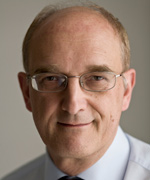Leszek Borysiewicz
Leszek Krzysztof Borysiewicz (born 13 April 1951) is a distinguished British physician, immunologist, and academic administrator, known for his significant contributions to vaccine development and higher education. He served as the Vice-Chancellor of the University of Cambridge from 2010 to 2017, playing a pivotal role in advancing the institution's global reputation for excellence in research and education.
Early Life and Education[edit | edit source]
Leszek Borysiewicz was born in Cardiff, Wales, to Polish parents who had settled in the UK after the Second World War. He attended Cardiff High School, demonstrating early on a keen interest in the sciences. Borysiewicz pursued his higher education at the University of Wales, where he earned his Bachelor of Science (BSc) degree. He furthered his studies at the University of London, obtaining a Doctor of Medicine (MD) degree, focusing on viral immunology, a field in which he would later make significant contributions.
Career[edit | edit source]
Borysiewicz's career is marked by his work in both the medical and academic fields. He began his career in medicine, specializing in immunology, and quickly moved into research roles that focused on the development of vaccines, particularly for viral diseases. His work has contributed to advances in the understanding and treatment of conditions such as human papillomavirus (HPV) and hepatitis B, leading to the development of vaccines that have had a global impact on public health.
In the academic arena, Borysiewicz held various positions at notable institutions. Before his appointment at the University of Cambridge, he was the Chief Executive of the Medical Research Council (MRC) in the UK, where he was instrumental in promoting and funding medical research. His leadership at the MRC was marked by a commitment to fostering innovation and collaboration between researchers and industry to accelerate the development of new treatments and therapies.
As Vice-Chancellor of the University of Cambridge, Borysiewicz championed the importance of education and research, advocating for policies and initiatives that supported the academic community and facilitated global partnerships. Under his leadership, the university saw significant growth in its research output and an expansion of its educational programs, reinforcing its status as one of the world's leading institutions of higher learning.
Awards and Honours[edit | edit source]
Throughout his career, Borysiewicz has received numerous awards and honours in recognition of his contributions to science and education. He has been elected a Fellow of the Royal Society (FRS), one of the highest honours for scientists in the UK, and a Fellow of the Academy of Medical Sciences (FMedSci), acknowledging his impact on medical research and public health.
Personal Life[edit | edit source]
Leszek Borysiewicz is married and has two children. He is known for his advocacy of science education and public understanding of science, often speaking on the importance of vaccines and the role of scientific research in addressing global challenges.
Legacy[edit | edit source]
Leszek Borysiewicz's legacy is characterized by his contributions to the advancement of medical science, particularly in the field of immunology and vaccine development, as well as his leadership in higher education. His work has had a lasting impact on public health and the global academic community, making him a respected figure in both fields.
Search WikiMD
Ad.Tired of being Overweight? Try W8MD's physician weight loss program.
Semaglutide (Ozempic / Wegovy and Tirzepatide (Mounjaro / Zepbound) available.
Advertise on WikiMD
|
WikiMD's Wellness Encyclopedia |
| Let Food Be Thy Medicine Medicine Thy Food - Hippocrates |
Translate this page: - East Asian
中文,
日本,
한국어,
South Asian
हिन्दी,
தமிழ்,
తెలుగు,
Urdu,
ಕನ್ನಡ,
Southeast Asian
Indonesian,
Vietnamese,
Thai,
မြန်မာဘာသာ,
বাংলা
European
español,
Deutsch,
français,
Greek,
português do Brasil,
polski,
română,
русский,
Nederlands,
norsk,
svenska,
suomi,
Italian
Middle Eastern & African
عربى,
Turkish,
Persian,
Hebrew,
Afrikaans,
isiZulu,
Kiswahili,
Other
Bulgarian,
Hungarian,
Czech,
Swedish,
മലയാളം,
मराठी,
ਪੰਜਾਬੀ,
ગુજરાતી,
Portuguese,
Ukrainian
Medical Disclaimer: WikiMD is not a substitute for professional medical advice. The information on WikiMD is provided as an information resource only, may be incorrect, outdated or misleading, and is not to be used or relied on for any diagnostic or treatment purposes. Please consult your health care provider before making any healthcare decisions or for guidance about a specific medical condition. WikiMD expressly disclaims responsibility, and shall have no liability, for any damages, loss, injury, or liability whatsoever suffered as a result of your reliance on the information contained in this site. By visiting this site you agree to the foregoing terms and conditions, which may from time to time be changed or supplemented by WikiMD. If you do not agree to the foregoing terms and conditions, you should not enter or use this site. See full disclaimer.
Credits:Most images are courtesy of Wikimedia commons, and templates Wikipedia, licensed under CC BY SA or similar.
Contributors: Prab R. Tumpati, MD

